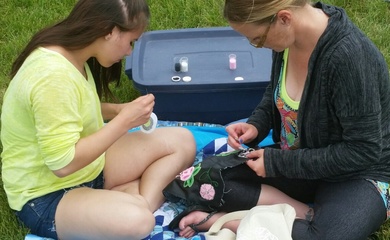Fostering is more than just a job.
For Ranch Ehrlo’s Treatment Foster Care (TFC) parents, that’s a common sentiment.
“Yes, it’s a professional service. But it’s also real love and real care,” said TFC parent Nadira Dechner.
The TFC is a specialized, accredited foster care service funded through the Ministry of Social Services. Our foster parents assume responsibility for youth in their care, as well as ensuring the youth are actively involved with their communities and birth families whenever possible. Parents have access to a wide variety of supports through Ranch Ehrlo Society and competitive remuneration is provided through a service contract.
Nadira sat down to discuss what it’s like to be a professional in the program and help shine a light on what it takes to be a foster parent for anyone considering joining. Although only one parent will be required to be a career caregiver, both parents must be willing to undertake training and supervision.
“A lot of the children that come into foster care have led very dysregulated lives,” Nadira said. “So basically, what you’re trying to do as a foster parent is establish routines and rhythm that is very predictable. Together with the team, we provide an environment for the child to thrive.”
Nadira and her husband have been part of the TFC for over a year.
“The support is phenomenal. It is true that if you foster through Ranch Ehrlo you may get more complex kids, but also, there is a lot of support for you,” Nadira said.
“For example, we have a program manager who works really hard to make sure that the right kids are placed in the right families. We all parent our own children as well, and it would be really hard to do that if it wasn’t a good fit.”
Once the placement is official, the support continues. A dedicated caseworker is involved with each placement, program staff is heavily involved in ensuring the success of each family, and schooling is made successful with a team of educators.
Their current foster son has been a long-term addition to their family. Along with his caseworker and educational team, the Dechners work with a pediatrician and an occupational therapist to help him succeed.
“Basically, with the Ranch, if you feel that there isn’t progress with the supports you have in place, then we look at who we need to add to the team. Everyone is very on top of it and very committed to the success of the child.”
The other foster families are equally committed. It’s not a typical 9 to 5 job, it is much, much more.
“It’s true for any job but especially for fostering – you cannot just see it as a job. It has to be something where your whole family is in, and preferably, where your whole family sees it as maybe a calling.”
For more information on being a Treatment Foster Care parent, or to apply, click here.


